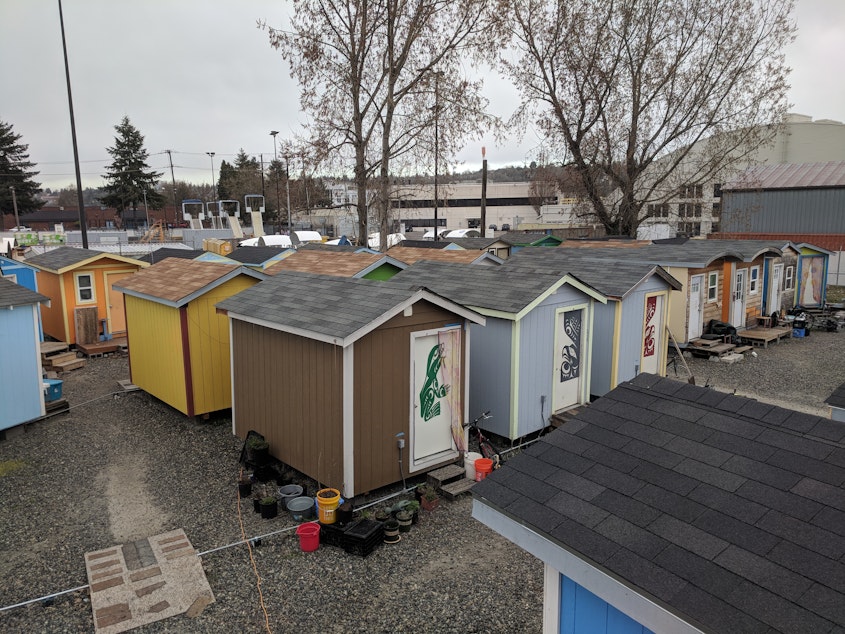Seattle homeless villages can stay longer, city says

The city of Seattle is extending the permits that were set to expire for three tiny house villages. Camp Second Chance in the Highland Park area, the Georgetown village and the Othello village in South Seattle will have their permits temporarily renewed for an additional six months.
During that time, city officials say they will work with service providers, residents, and the community to host meetings and develop a long-term strategy for villages citywide.
While homelessness remains at crisis levels in Seattle, proponents for the villages say they provide a place for people to stabilize and access services. At the same time, the villages have received strong pushback from community members who are concerned about crime levels and public safety.
The city has increased its investment in tiny house villages in recent years — just one part of its overall homelessness strategy. In 2018, the city invested $4.2 million in the villages. Throughout last year, the villages served 658 households citywide and exited 135 households from the programs into permanent housing.
There are currently nine permitted camps across Seattle. The city’s process, as laid out in a 2015 ordinance, allows them to be placed in neighborhoods for one year with the possibility of renewing permits for a second year.
In the past, some villages have relocated after their two years expired. Licton Springs, a low-barrier village in North Seattle, however, will shutter at the end of the month when its permit expires. Licton Springs has been controversial, drawing vocal opposition from some neighbors who are concerned about a rise in crime.
Sponsored
But the city doesn’t always stick to the original deal it made with neighborhoods.
Both the Georgetown and Camp Second Chance villages will extend past the two-year mark with the newly announced permit extensions at these sites. And the Othello village has been in its current location since 2016.
City officials say there are multiple avenues for permitting tiny house villages that are supported by city code. The three villages in question, for example, will be granted temporary-use permits for the next six months.
City spokesperson Will Lemke said things have changed since the city first started authorizing encampments and passed the original ordinance limiting their stay in neighborhoods.
“That was a much different program,” Lemke said. “It was very, very basic. And now it’s evolved to serve the needs of these folks.”
Sponsored
Where many of the camps once included groups of tents, all are now populated by tiny houses with locking doors and electricity. The villages also have case management and hygiene facilities, Lemke said.
One factor in the city's thinking has been that tiny house villages, intended to be a temporary stopping point on the way to permanent housing, are often attractive to people living in unauthorized encampments. Temporarily renewing permits for the Georgetown, Othello and Camp Second Chance sites will allow people living there to “continue to receive the care and stability they need to exit homelessness and keeps people from returning to living unsheltered on Seattle’s streets,” a city blog post states.
“We need to find a way for these programs to be able to continue to help people who are experiencing homelessness, and we have to do that with community," Lemke said. "So that’s what this process for the next six months will be."
Lemke said the city will consider a range of long-term strategies that include leaving villages where they are, closing some sites, expanding existing locations, or relocating villages. He said the city will also look at options like religious sponsorship of the camps.
Peter St. John is a member of the community advisory council connected to the Georgetown village.
Sponsored
He said he’s pleased residents of the site will continue to have access to all the camp provides. However, he said he’s been disappointed with the lack of communication and partnership from the city.
“It is unfortunate and frustrating that despite proactive attempts by our community to engage in constructive dialogue with the city of Seattle, we have not been able to do so,” St. John said in an email.
St. John said the change to the city's plan was only communicated to the neighborhood after the decision was made. Now he hopes the city will engage differently with the community over the next six months.
City spokesperson Will Lemke said the city has already been out listening to community.
During that process, Lemke said city officials realized more public input is necessary to develop a long-term strategy for the villages.
Sponsored
“We’re all in this together and we want to work with folks," Lemke said. "But we also want to be clear-eyed in that this is difficult."
The city has not yet provided dates for community meetings to discuss the long-term future of tiny house villages.




